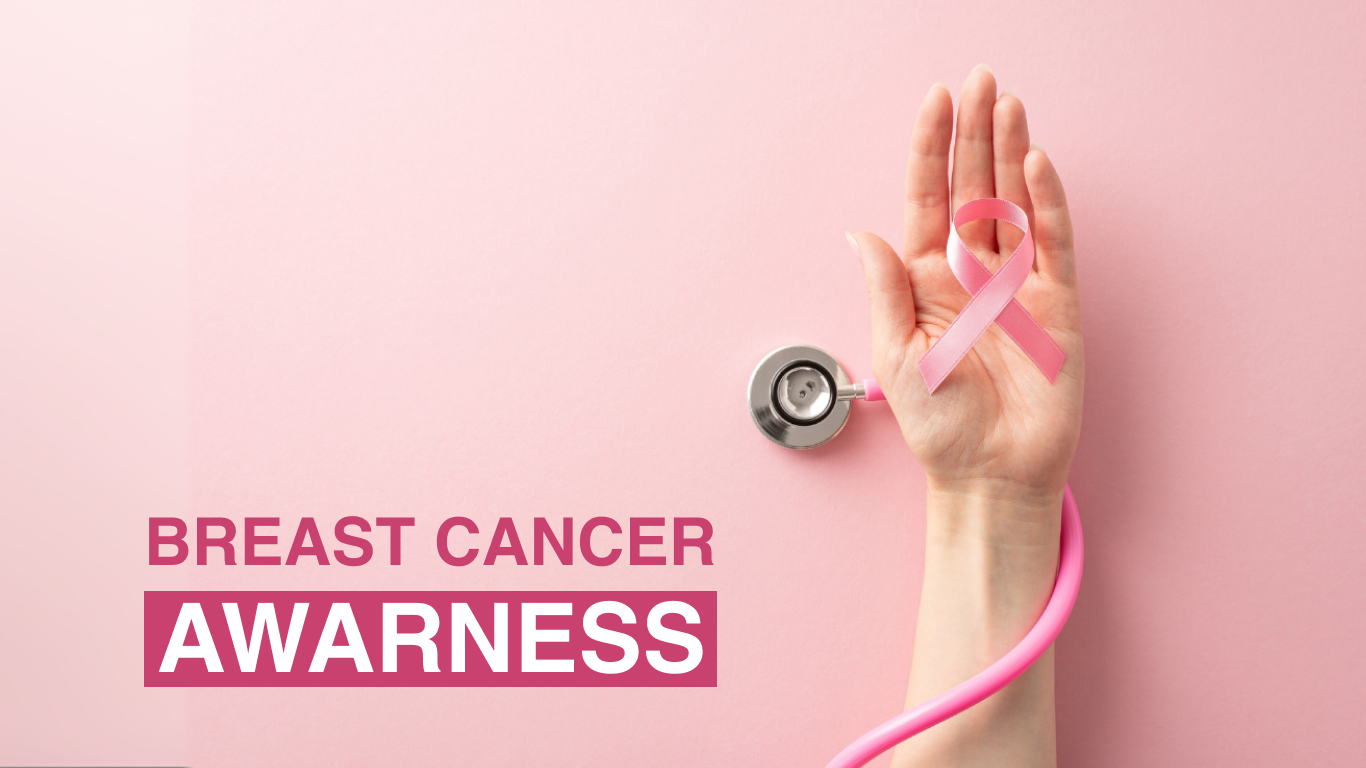
10 Jan, 2025

10 Jan, 2025
.png)
This article is medically reviewed by Dr. Mitchelle A. Engineer, Consultant – Breast Surgical Oncology, HCG Aastha Cancer Centre, Ahmedabad.
Breast Cancer Awareness Month is an awareness initiative that takes place every year. This worldwide campaign primarily aims to educate individuals about breast cancer, the risk factors associated with it, its key symptoms and signs, and the importance of early detection. It is a month aimed at sharing information, celebrating survivors, and gathering funds for research to develop better treatment approaches against breast cancer.
October is the dedicated month for celebrating Breast Cancer Awareness, during which breast cancer survivors, breast cancer patients, support groups, healthcare organizations, researchers, philanthropists, health activists, and others unite to fight against breast cancer and spread awareness.
Throughout the four weeks, events like charity walks, educational meetings, and assistance programs are held to remind women to prioritize their breast health through healthy lifestyle habits and regular breast cancer screening.
International Breast Cancer Awareness Day is celebrated on October 19th every year. The most common cancer in the world among females is breast cancer, and the most common cancer among females leading to mortality is also breast cancer in the majority of countries, including India. The incidence of breast cancer is increasing every year, and so is mortality. So, celebrating both Breast Cancer Awareness Month and Breast Cancer Awareness Day is crucial for the following reasons:
Knowing the various presentations of breast cancer may take away the mist from the illness and assist in understanding its symptoms and effects.
Invasive Breast Cancer: Cancer of this form spreads beyond the site of its origination (either from the breast ducts or lobules), i.e., into the surrounding breast tissue, lymph nodes, and other parts of the body. The prognosis is better if cancer is detected in its early stages.
Non-Invasive Breast Cancer: It does not breach the basement membrane and remains within the ducts and lobules of the breast, and there is no spread in the lymph nodes or other areas of the body. Non-invasive breast cancers, including Ductal Carcinoma in Situ (DCIS) and Paget’s disease, can convert to invasive breast cancers if ignored and not treated on time. It is also termed Stage 0 of breast cancer.
It becomes difficult to detect breast cancer early as it is painless, to begin with, so most patients tend to ignore it and are also not aware of the signs and symptoms of breast cancer. Learning about them, however, could save lives.
Signs and symptoms of breast cancer are as follows:
The above may also be seen in benign conditions, but it is important to seek medical advice for a proper diagnosis.
Breast self-examination, or BSE, is an easy, non-invasive way to monitor breast health at home. Women should do their BSE monthly, usually a week after menses when the breast swelling and tenderness (due to the hormonal influence) have settled down.
For women who have entered menopause, examination should be done on a fixed date every month. Here’s how to perform one:
By BSE, one will be able to identify changes in the breast early at home because of better acquaintance with them. Nevertheless, a breast self-examination is not a substitute for a clinical breast examination by a doctor and medical tests such as a mammogram.
A clinical breast examination is something that the doctor may do while you are going through your normal check-up. This involves manually checking your breasts for lumps or other abnormalities.
Women aged over 40 years should go for mammograms every year and maybe even earlier if they have family members with a history of breast cancer. This imaging test is one of the most effective screening tools for breast cancer detection at an early stage.
In addition to mammograms, a breast MRI may be recommended for high-risk women, such as those having BRCA gene mutations or with a strong family history and also with dense breasts.
Taking charge of your breast health is critical to lowering the breast cancer risk. Here are some things that can be done daily to achieve this:
HCG Cancer Centre, a leading cancer hospital in India, organizes several awareness talks, panel discussions, awareness drives, and more across the country during October. For more updates, we recommend you follow us on Facebook, Instagram, LinkedIn, and YouTube.
Breast Cancer Awareness Month is important globally so that people understand the importance of early detection and timely treatment, encourage and support breast cancer research, and stand strong by those fighting breast cancer. Participating in these awareness campaigns, understanding the risk factors, being mindful of different breast cancer symptoms, and seeking medical attention whenever necessary will help us put ourselves a step ahead of breast cancer.
Breast Cancer Awareness and Association with Frequency of Screening Among Women — China, 2020 - PMC
Breast Cancer Awareness Month | UICC
Breast Cancer Information | Susan G. Komen®
Dyspnea Management in Early Stage Lung Cancer: A Palliative Perspective - PMC
.png)
Author Bio : Dr. Mitchelle A. Engineer
Consultant – Breast Surgical Oncology
MBBS, MS (General Surgery)
Dr. Mitchelle A. Engineer is a highly skilled breast oncosurgeon with six years of experience in performing different types of breast cancer surgeries, including modified radical mastectomy, breast conservation surgery, and breast oncoplastic surgery. She is available for consultation at HCG Aastha Cancer Centre, a comprehensive cancer hospital in Ahmedabad. She completed her MBBS and MS in General Surgery at M.P. Shah Medical College in Gujarat. Dr. Mitchelle completed her HBNI fellowship in breast surgical oncology at Tata Memorial Hospital in Mumbai. With a deep commitment to personalized care, Dr. Mitchelle charts individualized care plans for her patients based on their health profiles. In addition to her clinical responsibilities, she is also involved in cancer research and aims to contribute to the ever-evolving landscape of oncology.
To book an appointment with Dr. Mitchelle A. Engineer, please click here.